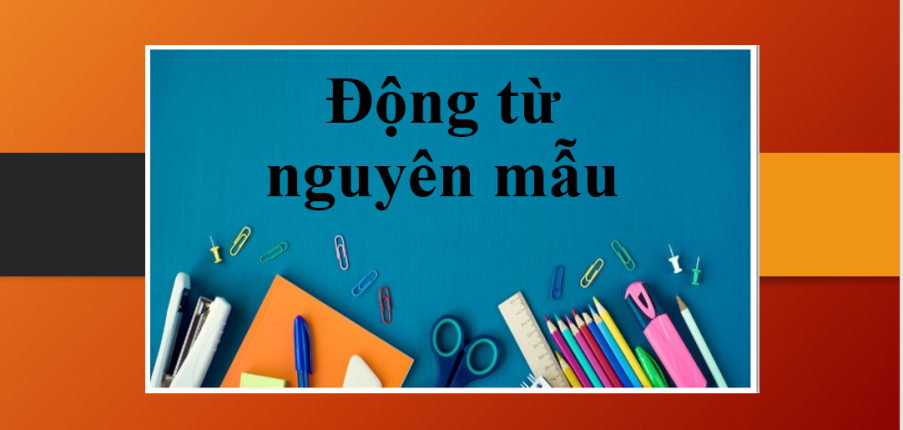Động từ nguyên mẫu (Infinitive) | Khái niệm, cấu trúc, cách dùng, phân loại và bài tập vận dụng
Sơ lược về động từ nguyên mẫu
1. Động từ nguyên mẫu là gì?
Động từ nguyên mẫu là một hình thức cơ bản của một động từ trong tiếng Anh. Dạng động từ này bao gồm 2 loại, đó là có to và không có to, cụ thể:
- Động từ nguyên mẫu có “to”. Ví dụ: She decided to go to Korea (Cô ấy đã quyết định đi Hàn Quốc).
- Động từ nguyên mẫu không có “to”. Ví dụ: I’d rather not eat chicken (Tôi không muốn ăn thịt gà).
Một số ví dụ khác:
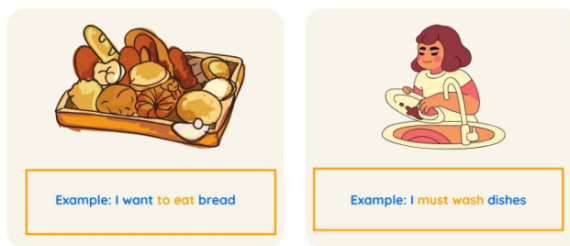
2. Dạng thức của động từ nguyên mẫu
Trong tiếng Anh, khi nhắc tới động từ nguyên mẫu, mọi người thường đề cập đến hình thức của động từ hiện tại nguyên mẫu, là hình thức phổ biến, được sử dụng nhiều nhất. Tuy nhiên, còn có 4 hình thức khác trong tiếng Anh, đó là:
- Nguyên mẫu hoàn thành
- Nguyên mẫu hoàn thành tiếp diễn
- Nguyên mẫu tiếp diễn
- Nguyên mẫu thụ động
Tuy nhiên, trong bài viết này chúng ta chỉ tập trung tìm hiểu về nguyên mẫu hiện tại, động từ nguyên mẫu hiện tại có 2 dạng:
- Nguyên mẫu có to = to + phần gốc
- Nguyên mẫu zero = phần gốc
Ví dụ:
| Nguyên mẫu có To |
Nguyên mẫu Zero |
| to go |
go |
| to become |
become |
| to eat |
eat |
| to wash |
wash |
Các động từ nguyên mẫu thể phủ định trong tiếng Anh được hình thành bằng cách đặt từ not ở phía trước của hình thức nguyên mẫu bất kỳ. Ví dụ:
- I decided not to go to Hai Duong (Tôi quyết định không đi Hải Dương).
- I’d rather not vegetable (Tôi không muốn ăn rau).
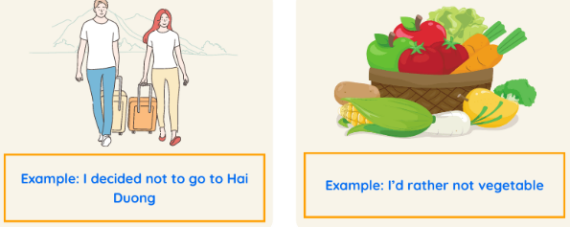
Cấu trúc và cách dùng động từ nguyên mẫu có “to”
1. Dùng làm chủ ngữ trong câu
Động từ nguyên mẫu có “to” thường được dùng làm chủ ngữ trong câu. Ví dụ cụ thể như:
- To visit Korea is my life-long dream (Được đến thăm Hàn Quốc là ước mơ cả đời của tôi).
- To become a famous writer is her goal (Mục tiêu của cô là trở thành một nhà văn nổi tiếng).
2. Dùng làm tân ngữ trong câu
Tân ngữ của động từ
Tân ngữ của động từ: Kiến thức ngữ pháp này đứng sau một số động từ (tìm hiểu tại đây) , thường làm tân ngữ cho các từ đó.
Ví dụ: It’s very important for Anna to be patient with her little brother. Bảng cụ thể về một số động từ theo sau là “to infinitive” (Verb + to V nguyên mẫu):
| STT |
Động từ (Verbs) |
Nghĩa (Meaning) |
STT |
Động từ (Verbs) |
Nghĩa (Meaning) |
| 1 |
Hope |
Hy vọng |
13 |
seem |
Dường như |
| 2 |
Offer |
Đề nghị |
14 |
Decide |
Quyết định |
| 3 |
Expect |
Mong đợi |
15 |
Manage |
Xoay xở, cố gắng |
| 4 |
Plan |
Lên kế hoạch |
16 |
Agree |
Đồng ý |
| 5 |
Refuse |
Từ chối |
17 |
Afford |
Đáp ứng |
| 6 |
Want |
Muốn |
18 |
Arrange |
Sắp xếp |
| 7 |
Promise |
Hứa |
19 |
Appear |
Hình như |
| 8 |
Pretend |
Giả vờ |
20 |
Learn |
Học |
| 9 |
Fail |
Thất bại, hỏng |
21 |
Would like |
muốn |
| 10 |
Attempt |
Cố gắng, nỗ lực |
22 |
Offer |
Cho, tặng, đề nghị |
| 11 |
Tend |
Có khuynh hướng |
23 |
Intend |
Định |
Tân ngữ của tính từ
Ngoài ra chúng còn được sử dụng như tân ngữ của một tính từ tiếng Anh. Ví dụ:
- It’s good to talk with you. (Thật tốt khi nói chuyện với bạn).
- It’s important for Lam to be patient with his little sister. (Điều quan trọng với Lâm là phải kiên nhẫn với em gái của ang ấy).
3. Được dùng trong cấu trúc Verbs + Object + To infinitive
Chúng ta sẽ thường xuyên sử dụng cấu trúc “to + V nguyên mẫu” nếu phía trước của nó có các động từ sau đây:
| STT |
Động từ (Verbs) |
Nghĩa (Meaning) |
STT |
Động từ (Verbs) |
Nghĩa (Meaning) |
| 1 |
Advise |
Khuyên |
14 |
Invite |
Mời |
| 2 |
Allow |
Cho phép |
15 |
Need |
Cần |
| 3 |
Ask |
Hỏi |
16 |
Order |
Gọi món |
| 4 |
Beg |
Cầu xin |
17 |
Permit |
Cho phép |
| 5 |
Cause |
Gây ra |
18 |
Persuade |
Thuyết phục |
| 6 |
Challenge |
Thử thách |
19 |
Remind |
Nhắc nhở |
| 7 |
Convince |
Thuyết phục |
20 |
Require |
Yêu cầu |
| 8 |
Encourage |
Khuyến khích |
21 |
Recommend |
Giới thiệu |
| 9 |
Expect |
Mong chờ |
22 |
Teach |
Dạy |
| 10 |
Forbid |
Ngăn cấm |
23 |
Tell |
Nói |
| 11 |
Force |
Bắt buộc |
24 |
Urge |
Thúc giục |
| 12 |
Hire |
Thuê, mướn |
25 |
Want |
Muốn |
| 13 |
Instruct |
Hướng dẫn |
26 |
Warn |
Cảnh báo |
Ví dụ:
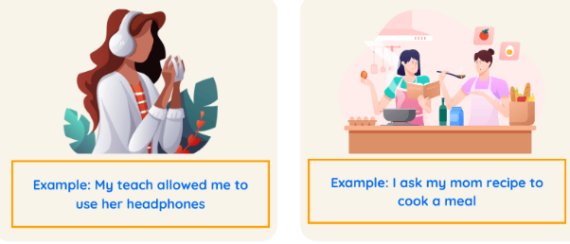
4. Đứng sau từ nghi vấn
Ngoài ra, động từ nguyên mẫu trong tiếng Anh có đứng sau từ nghi vấn. Tuy nhiên, ta nên lưu ý rằng to V nguyên mẫu sẽ không đứng sau từ để hỏi Why. Ví dụ:
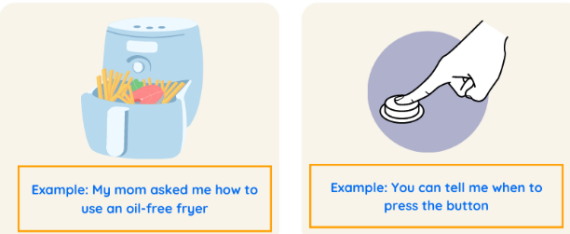
Cấu trúc và cách dùng động từ nguyên mẫu không có “to”
1. Thường đi kèm với các động từ như: make/ let/ help
S + Make/ Let/ Help + Object + V nguyên mẫu
Ví dụ cụ thể:
- His parents let him stay out late (Bố mẹ anh ấy để anh ấy đi chơi muộn).
- Let’s go to the station tonight (Hãy đến nhà ga tối nay).
2. Đứng sau động từ chỉ cảm giác, giác quan
S + Verbs of perception + Object + V nguyên mẫu/ V-ing
Các động từ chỉ tri giác (hear, sound, smell, taste, feel, watch, notice, see, listen, find,…) + O + V nguyên mẫu
Các động từ chỉ tri giác (hear, sound, smell, taste, feel, watch, notice, see, listen, find,…) + O + V-ing
Ví dụ cụ thể:
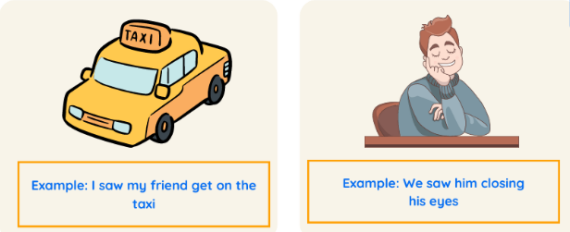
3. Đứng sau “had better”
Một số ví dụ cụ thể về động từ nguyên mẫu không “to” đứng sau “had better”. Một số ví dụ cụ thể, đó là:
- They had better take some warm clothing (Tốt hơn là họ nên mặc một ít quần áo ấm).
- You’d better give your friend your address (Tốt hơn hết bạn nên cho người bạn của mình địa chỉ của mình).
4. Sử dụng với Why
Động từ nguyên mẫu không “to” với why khi đưa ra một số lời đề nghị, ví dụ như:
- Why wait until tomorrow? (Tại sao phải đợi đến ngày mai?).
- Why walk when we can go in the car? (Tại sao phải đi bộ khi chúng ta có thể đi bằng ô tô?).
Bài tập Động từ nguyên mẫu
Ex 1. Cho dạng đúng của động từ trong ngoặc
1. He wanted (see) _____________________the house where the president was born.
2. He is expected (arrive) _____________________in a few days.
3. I would like him (go) ________ to a university but I can’t (make) ________ him go.
4. I arranged (meet) _____________________them there.
5. He urged us (work) _____________________faster.
6. I wish (see) _____________________the manager.
7. He warned her (not touch) _____________________the wire.
8. Don’t forget (lock) _____________________the door before going to bed.
9. My mother told me (not speak) _____________________to anyone about it.
10. He tried (explain) ________but she refused (listen) ______.
11. He decided (disguise) __________________ himself by dressing as a woman.
12. I am prepared (wait) _____________________here all night if necessary.
13. Would you mind showing me how (work) _____________________the lift.
14. After walking for three hours we stopped (rest) ________ and let the others (catch) ____ up with us.
15. I am beginning (understand) _____________________what you mean.
16. I regret (inform) _____________________you that your application has been refused.
17. I don’t allow my family (smoke) _____________________at all.
18. I tried (persuade) ____________him (agree) _________with your proposal.
19. Your windows need (clean) __________. Would you like me (do) ___________them for you?
20. Stop (talk) _____________. I am trying (finish) ________a letter.
21. His doctor advised him (give) _____________________up jogging.
22. Some people seem (have) _____________the passion for writing to the newspapers.
23. He expects me (answer) _____________by return but I have no intention of replying at all.
24. He postponed making a decision until it was too late (do) _____________anything.
25. Try (forget) _____________it. It isn’t worth worrying about it.
26. The horse won’t be well enough (run) _______ in tomorrow’s race. He doesn’t seem (have) _______ recovered from his long journey.
27. It wouldn’t be safe (start) _____________down now; we will have (wait) _____________till the mist clears.
28. It’s not much use having a bike if you don’t know how (use) _____________it.
29. I distinctly remember (pay) _____________him. I gave him 2$.
30. Did you remember (give) _____________him the key of the safe? – No, I didn’t. I will go and do it now.
Đáp án:
| 1. to see |
2. to arrive |
3. to go – make |
4. to meet |
5. to work |
6. to see |
| 7. not to touch |
8. to lock |
9. not to speak |
10. to explain – to listen |
11. to disguise |
12. to wait |
| 13. to work |
14. to rest – catch |
15. to understand/
understanding
|
16. to inform |
17. to smoke |
18.to persuade – to agree |
| 19. to be cleaned/cleaning – to do |
20. talking – to finish |
21. to give |
22. to have |
23. to answer |
24. to do |
| 25. to forget |
26. to run – to have |
27. to start – to wait |
28. to use |
29. paying |
30. giving |
Ex2. Cho dạng đúng của động từ
1. They are used to (prepare) _______ new lessons.
2. By (work) _______ day and night , he succeeded in ( finish) _______ the job in time.
3. His doctor advised him (give) _______up (smoke)_______.
4. Please stop (talk)_______. We will stop (eat) _______lunch in ten minutes.
5. Stop (argue) _______and start (work) _______.
6. I like (think) _______carefully about things before (make) _______decision.
7. Ask him (come) _______in. Don't keep him (stand) _______at the door.
8. Did you succeed in (solve) _______the problem?
9. Don’t forget (lock)_______ the door before (go)_______ to bed.
10. Don’t try (persuade) _______ me . Nothing can make me (change)_______ my mind.
Đáp án
1. preparing
2. working – finishing
3. to give up – smoking
4. talking – to eat
5. arguing – to work
6. to think – making
7. to come – standing
8. solving
9. to lock – going
10. to persuade
Ex 3: Chia các động từ trong ngoặc sau đây thành dạng To V hoặc V-ing
1. Nam suggested ________ (talk) the children to school yesterday.
2. They decided _________ (play) tennis with us last night.
3. Mary helped me ________ (repair) this fan and _______ (clean) the house.
4. We offer ________ (make) a plan.
5. We required them ________ (be) on time.
6. Kim wouldn’t recommend him _______ (go) here alone.
7. Before ________ (go) to bed, my mother turned off the lights.
8. Minh is interested in ________ (listen) to music before _____ (go) to bed.
9. This robber admitted ______ (steal) the red mobile phone last week.
10. Shyn spends a lot of money ________ (repair) her car.
11. It took me 2 hours _______ (buy) the clothes and shoes.
12. Do you have any money ________ (pay) for the hat?
13. Would you like ________ (visit) my grandparents in Paris?
14. Don’t waste her time ___________(complain) about her salary.
15. That questions need ___________ (reply).
16. Viet is used to ________ (cry) when he faces his difficulties.
17. It’s time they stopped ______ (work) here.
18. Will she remember _______ (collect) his suit from the dry – cleaners or shall I do it?
19. Jim forgot ________ (send) this message last night.
20. Hung stopped ______ (eat) meat yesterday.
Đáp án
1. Nam suggested ____talking____ (talk) the children to school yesterday.
2. They decided _____to play____ (play) tennis with us last night.
3. Mary helped me ____repair____ (repair) this fan and ____clean___ (clean) the house.
4. We offer ____to make____ (make) a plan.
5. We required them ___to be_____ (be) on time.
6. Kim wouldn’t recommend him ____to go___ (go) here alone.
7. Before ____going____ (go) to bed, my mother turned off the lights.
8. Minh is interested in ____listening____ (listen) to music before ___going__ (go) to bed.
9. This robber admitted ____stealing__ (steal) the red mobile phone last week.
10. Shyn spends a lot of money ____repairing____ (repair) her car.
11. It took me 2 hours ____to buy___ (buy) the clothes and shoes.
12. Do you have any money ____to pay____ (pay) for the hat?
13. Would you like ____to visit____ (visit) my grandparents in Paris?
14. Don’t waste her time ______complaining_____(complain) about her salary.
15. That questions need _____replying______ (reply).
16. Viet is used to ____crying____ (cry) when he faces his difficulties.
17. It’s time they stopped ____working__ (work) here.
18. Will she remember ____to collect___ (collect) his suit from the dry – cleaners or shall I do it?
19. Jim forgot ____sending____ (send) this message last night.
20. Hung stopped ___to eat___ (eat) meat yesterday.
Ex 4: Hoàn thành câu với động từ nguyên mẫu thích hợp.
- They decided __________ (go) to the beach this weekend.
- He wants __________ (learn) how to play the guitar.
- I need __________ (buy) some groceries for dinner.
Đáp án
- They decided to go to the beach this weekend.
- He wants to learn how to play the guitar.
- I need to buy some groceries for dinner.
Ex 5: Sắp xếp các từ thành câu hoàn chỉnh.
- They / plan / to / travel / next month.
- She / prefer / to / stay / at home / during the weekend.
- He / hope / to / find / a new job / soon.
- We / try / to / save / money / for our trip.
- I / decide / to / start / a new hobby / this year.
Đáp án
- They plan to travel next month.
- She prefers to stay at home during the weekend.
- He hopes to find a new job soon.
- We try to save money for our trip.
- I decide to start a new hobby this year.
Ex 6: Điền động từ thích hợp vào chỗ trống.
- They need __________ (clean) their house before the guests arrive.
- He plans __________ (visit) his grandparents next weekend.
- We like __________ (go) for a walk in the park in the mornings.
Đáp án
- They need to clean their house before the guests arrive.
- He plans to visit his grandparents next weekend.
- We like to go for a walk in the park in the mornings.
Ex 7: Chọn đáp án đúng
1. The teacher decided (accepting/to accept) the paper.
2. They appreciate (to have/having) this information.
3. His father doesn’t approve of his (going/ to go) to Europe.
4. We found it very difficult (reaching/ to reach) a decision.
5. Donna is interested in (to open/opening) a bar.
6. George has no intention of (to leave/leaving) the city now.
7. We are eager (to return/returning) to school in the fall.
8. We would be better off (to buy/ buying) this car.
9. She refused (to accept/ accepting) the gift.
10. Mary regrets (to be/being) the one to have to tell him.
11. George pretended (to be/being) sick yesterday.
12. Carlos hopes (to finish/finishing) his thesis this year.
13. They agreed (to leave/leaving) early.
14. Helen was anxious (to tell/ telling) her family about her promotion.
15. We are not ready (to stop/stopping) this research at this time.
16. Henry shouldn’t risk (to drive/driving) so fast.
17. He demands (to know/knowing) what is going on.
18. She is looking forward to (return/returning) to her country.
19. There is no excuse for (to leave/leaving) the room in this condition.
20. Gerald returned to his home after (to leave/leaving) the game.
Đáp án
1. To accept
2. Having
3. Going
4. To reach
5. Opening
6. Leaving
7. To return
8. Buying
9. To accept
10. To be
11. To be
12. To finish
13. To leave
14. To tell
15. To stop
16. Driving
17. To know
18. Returning
19. Leaving
20. Leaving
Ex 8: Lựa chọn đáp án đúng
1. My father usually helps me_______ English.
a. to learn
b. lean
c. learning
d. both a and b
2. He was heard_______ shout.
a. to
b. of
c. by
d. at
3. This student expected_______ the first winner of the Grand Prix.
a. be
b. being
c. to be
d. will be
4. I told her_______ about her wedding; everything will straighten out.
a. don't worry
b. not to worry
c. no worry
d. not worry
5. May I suggest you let_______
a. Mary doing so
b. Mary do so
c. Mary does to
d. Mary to do so
6. She_______ him when he called her.
a. pretended not hear
b. pretended she heard not
c. pretended not to hear
d. did not pretend hear
7. The doctor advised_______ late.
a. me not staying up
b. me not stay up
c. me not to stay up
d. I did not stay up
8. The school superintendent told me_______
a. hurrying up
b. to hurry up
c. hurry up
d. hurried up
9. "_______us face the enemies", shouted the soldiers.
a. Make
b. Let
c. Leave
d. Keep
10. Mr. Brown told the schoolgirls_______ in class.
a. don't ear
b. not to eat
c. eat not
d. not eat
11. I have heard Dang Thai Son_______ the piano.
a. played
b. plays
c. play
d. to play
12. The young teachers wanted a Foreign Language Teaching workshop _______ in Ho Chi Minh City.
a. to be holding
b. should hold
c. to be held
d. to hold
13. _______able to take part in the international math contest two years from now, Son works very hard in his math class.
a. In order to be
b. Being
c. Been
d. So that he be
14. Try_______ so many mistakes.
a. not to make
b. not make
c. to make not
d. make not
15. Let me_______ from you soon.
a. to hear
b. hear
c. hearing
d. heard
16. John is too stupid_______ understand this.
a. to
b. not to
c. to not
d. for
17. The wind is_______ to blow the roof off.
a. strong enough
b. too strong
c. quiet strong
d. very strong
18. My father is _______ to stay up late.
a. too tired
b. enough tired
c. tired enough
d. so tired
19. John wanted me_______ him.
a. to be helping
b. help
c. to help
d. I help
20. I want_______ early tomorrow morning.
a. to leave
b. leaving
c. me leave
d. me leaving
Đáp án
| 1d |
2a |
3c |
4b |
5b |
6c |
7c |
8b |
9b |
10b |
| 11c |
12c |
13a |
14a |
15b |
16a |
17a |
18a |
19c |
20a |
Ex 9: Lựa chọn đáp án đúng
1. I hope_______
a. to see you there
b. seeing you there
c. you to see there
d. see you there
2. I taught_______
a. how mending a shirt
b. him how to mend a shirt
c. how mend a shirt
d. him how mend a shirt
3. I told_______
a. Nam to come
b. to come Nam
c. to Nam come
d. Nam come
4. My father has decided_______ a new house.
a. find
b. to find
c. finding
d. him find
5. Mother warned_______ the electric plug
a. here not to touch
b. her touching not
c. her not touch
d. not touch
6. Don't tell Tan because I don't want_______
a. him to know
b. know
c. him know
d. knowing
7. She explained_______
a. how to make it
b. me how to make it
c. me to make it
d. me make it
8. Miss Brown told Mary_______ down.
a. sit
b. to sit
c. sitting
d. sat
9. She told Mary_______ up hope.
a. not give
b. do not give
c. not to give
d. to give not
10. Michael Faraday wrote a litter to Sir Humphry Davy_______ for work.
a. asked
b. to ask
c. so to ask
d. in order to asking
11. Do you know_______ to play that game now?
a. way
b. what
c. if
d. how
12. She is very glad_______ see you again.
a. in
b. with
c. to
d. for
13. He noticed two thieves_______ out of a shop.
a. to come
b. are coming
c. in coming
d. come
14. When will he be allowed to go home? When will they_______?
a. let him go
b. let to go
c. leave him to go
d. leave him
15. The guide encouraged the tourists_______ the Prado Museum Madrid
a. visit
b. to visit
c. visiting
d. to visiting
16. Mow that were finished painting the house, there's nothing left_______
a. done
b. did
c. to do
d. for doing
17. The superintendent promised to tear down and_______ the fire damaged school
building.
a. rebuild
b. to rebuild
c. rebuilding
d. to rebuilding
18. The mechanic needs_______ a new muffler on your car.
a. to put
b. putting
c. to be put
d. to putting
19. Our house needs_______
a. to paint
b. to be painting
c. to be paint
d. painting
20. Do you want _______ by the doctor?
a. to examine
b. to be examined
c. being examined
d. being to examine
Đáp án
| 1a |
2b |
3a |
4b |
5a |
6a |
7a |
8b |
9c |
10b |
| 11d |
12c |
13d |
14a |
15b |
16c |
17a |
18a |
19d |
20b |
Xem thêm các tài liệu Tiếng Anh hay, chi tiết khác:
TOP Việc làm "HOT" dành cho sinh viên:
